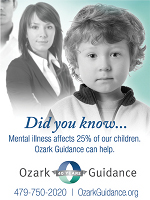By Deborah Dawes, PhD, Ozark Guidance
Until very recently Attention Deficit Disorder was considered to be a problem of childhood that kids grew out of. Now it is becoming clear that it is a neuropsychological disorder that persists, but that many sufferers have developed coping skills or struggle without knowing what the real problem is.
One book addressing this for adults is called You Mean I’m Not Lazy, Stupid or Crazy?! by Kate Kelly and Peggy Ramundo. The very title points to the importance of early diagnosis, so that people with the disorder do not have to struggle with believing themselves to be at fault for essentially a biophysical brain problem.
To prevent lifelong problems caused by ADHD, the dedicated staff at Ozark Guidance work to assure that children are correctly diagnosed and receive the appropriate care. These children are thus equipped to have a successful life undamaged by problems with ADHD.
What is ADHD?
According to the Mayo Clinic: “Attention-deficit/hyperactivity disorder (ADHD) is a chronic condition that affects millions of children and often persists into adulthood. ADHD includes some combination of problems, such as difficulty sustaining attention, hyperactivity and impulsive behavior. Children with ADHD also may struggle with low self-esteem, troubled relationships and poor performance in school.” The Centers for Disease Control (the CDC) reports that: “People with ADHD have trouble paying attention, controlling impulsive behaviors (might act without thinking about what the result will be), and in some cases, are overly active.”
While ADHD isn’t cured by treatment, the problems it causes can be significantly reduced and coping abilities developed such that children with ADHD can flourish.
ADHD Diagnosis
The National Center for Mental Health (NIMH) sums up the diagnostic process in the following paragraphs:
Children mature at different rates and have different personalities, temperaments, and energy levels. Most children get distracted, act impulsively, and struggle to concentrate at one time or another. Sometimes, these normal factors may be mistaken for ADHD.
ADHD symptoms usually appear early in life, often between the ages of 3 and 6, and because symptoms vary from person to person, the disorder can be hard to diagnose. Parents may first notice that their child loses interest in things sooner than other children, or seems constantly “out of control.” Often, teachers notice the symptoms first, when a child has trouble following rules, or frequently “spaces out” in the classroom or on the playground.
No single test can diagnose a child as having ADHD. Instead, a licensed health professional needs to gather information about the child, and his or her behavior and environment. A family may want to first talk with the child’s pediatrician. Some pediatricians can assess the child themselves, but many will refer the family to a mental health specialist with experience in childhood mental disorders such as ADHD. The pediatrician or mental health specialist will first try to rule out other possibilities for the symptoms. For example, certain situations, events, or health conditions may cause temporary behaviors in a child that seem like ADHD.
As the Mayo Clinic points out: “A diagnosis of ADHD can be scary, and symptoms can be a challenge for parents and children alike. However, treatment can make a big difference, and most children with ADHD grow up to be normal adults.”
ADHD Treatment
Most often the treatment with the best results includes medication and behavioral therapy. This is a brain dysfunction, and medication allows the brain to function appropriately, permitting the attention and focus needed to accomplish both daily and developmental tasks. Behavioral and psychological treatment helps the child develop the coping skills that support focus and organization, and to deal with any of the self-esteem or disruptive problems that the condition caused. The mental health professional also helps build the necessary understanding that parents and teachers need to help the child in their care develop optimally.
From NIMH:
How can parents help?
Children with ADHD need guidance and understanding from their parents and teachers to reach their full potential and to succeed in school. Before a child is diagnosed, frustration, blame, and anger may have built up within a family. Parents and children may need special help to overcome bad feelings. Mental health professionals can educate parents about ADHD and how it impacts a family. They also will help the child and his or her parents develop new skills, attitudes, and ways of relating to each other.
 Ozark Guidance stands ready to answer your questions and provide the appropriate services for the needs of your child. If you have reason to be concerned that this may be a problem for you child, as it is for almost 10% of the children in America according to the CDC, don’t hesitate to call us for help. 479-750-2020.
Ozark Guidance stands ready to answer your questions and provide the appropriate services for the needs of your child. If you have reason to be concerned that this may be a problem for you child, as it is for almost 10% of the children in America according to the CDC, don’t hesitate to call us for help. 479-750-2020.
Resources on the web:
- CHADD (Children and Adults with Attention-Deficit/Hyperactivity Disorder)
www.chadd.org - ADDA (Attention Deficit Disorder Association)
www.add.org - National Resource Center on AD/HD
www.help4adhd.org

